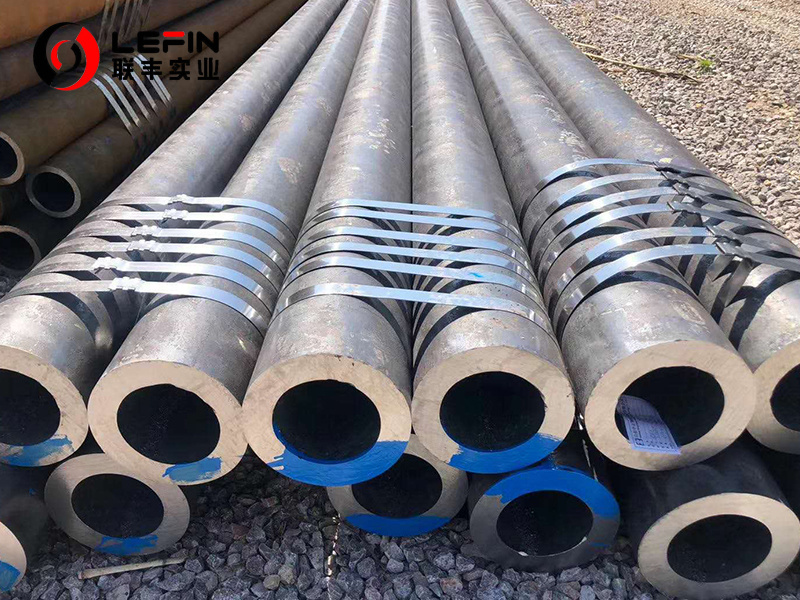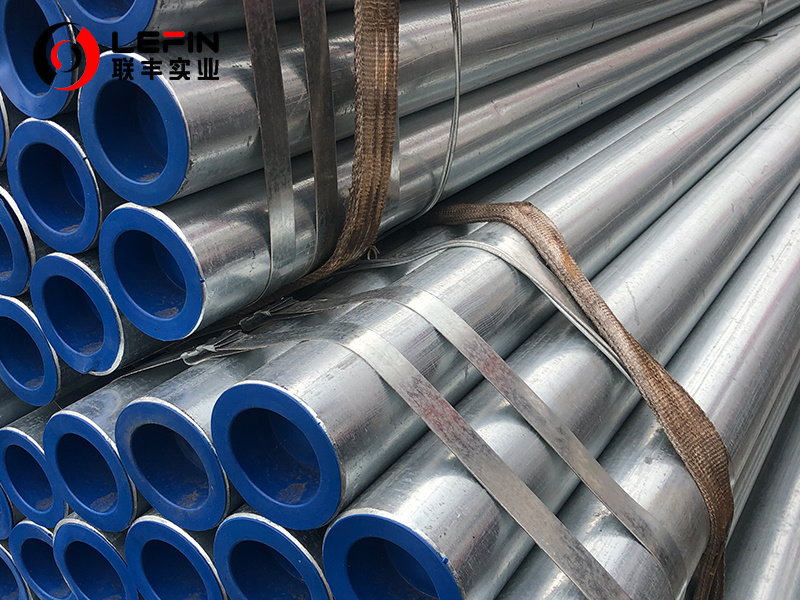
- Details
-
The following is a comprehensive introduction to Galvanized Seamless pipes, covering their features, production processes, application fields, quality specifications and market prospects:
I. Basic concepts and characteristics
1.Definition and StructureGalvanized seamless steel pipes are pipes in which a zinc-iron alloy layer is formed on the surface of seamless steel pipes through the hot-dip galvanizing process. Its core is made of carbon steel (such as Q195, Q215, Q235, Q345, etc.) , which combines the strength of seamless steel pipes with the anti-corrosion performance of galvanized layers.
2.Core characteristics- Strong corrosion resistance: The zinc layer isolates air, water and other media, extending the service life to more than 20 years ;
- High strength and wear resistance: The base material is treated by rolling or cold drawing processes, and its compressive strength is increased several times.
- High-temperature adaptability: It can operate stably in high-temperature environments (such as heating systems, oil pipelines) and is not prone to deformation ;
- Convenient construction: Smooth surface, easy to cut, weld and connect .
II. Production process
1.Key stepsSurface treatment: Pickling is carried out to remove the oxides and oil stains on the surface of the steel pipe to ensure the adhesion of the zinc layer ;
Hot-dip galvanizing
Temperature control: The temperature of the zinc liquid needs to be stabilized at 450-460°C;
Zinc immersion time: Adjust according to the thickness of the pipe wall (usually 1-5 minutes) to avoid missed plating or uneven zinc coating ;
Cooling and setting: Curing the zinc layer by water cooling or air cooling .
2.Process typeHot-dip galvanizing method: Suitable for large-diameter pipes (outer diameter 21.3-610mm), with low cost and excellent anti-corrosion performance;
Cold plating method: Used for small-diameter precision tubes, with uniform and bright coating.
3.Specification for zinc coating thicknessSteel pipe wall thickness (mm) Minimum average zinc coating thickness (μm) 1.5 ≥45 1.5-3 ≥55 3-6 ≥70 ≥6 ≥85
According to industry standards (such as ASTM A53).
III. Application fields
1.Architecture and Municipal EngineeringStructural supports (Bridges, stairs), underground drainage systems, roof drainage ;
Heating pipes (high-temperature resistance ≥100°C) .
2.Energy and Chemical EngineeringOil/gas transmission pipelines (high-pressure environment, pressure grade ≥20MPa) ;
Chemical equipment (resistant to acid and alkali corrosion, such as acid washing tanks, reactor pipelines).
3.Mechanical manufacturing and transportationAutomobile chassis, exhaust system ;
Mining machinery supports, underground drainage pipes .
IV. Quality control and frequently asked questions
Reasons for Leakage Plating:
Residual oil stains or oxide scale on the surface;
Excessive iron content in the zinc liquid (>0.05%) or temperature fluctuations;
Improper immersion Angle leads to bubble retention .
Solution:Enhanced pickling and sandblasting pretreatment ;
Regularly test the composition of the zinc liquid and control the impurity content .
V. Specifications and markets
Common specifications:Outer diameter: 10-720mm (commonly 21.3-610mm)
Wall thickness: 1.5-75mm (e.g., the wall thickness of DN32 pipes is ≥2.5mm)
Length: Fixed length 4-12 meters (customizable).

VI. Conclusion
Galvanized seamless steel pipes, through the combination of seamless base pipes and zinc alloy coatings, have solved the problems of easy corrosion and insufficient pressure resistance of traditional welded pipes, and have become core materials in the fields of construction, energy and machinery. Its performance is highly dependent on technological accuracy
GALVANIZED SEAMLESS PIPE
Subcategory
Keyword
- Details
-
The following is a comprehensive introduction to Galvanized Seamless pipes, covering their features, production processes, application fields, quality specifications and market prospects:
I. Basic concepts and characteristics
1.Definition and StructureGalvanized seamless steel pipes are pipes in which a zinc-iron alloy layer is formed on the surface of seamless steel pipes through the hot-dip galvanizing process. Its core is made of carbon steel (such as Q195, Q215, Q235, Q345, etc.) , which combines the strength of seamless steel pipes with the anti-corrosion performance of galvanized layers.
2.Core characteristics- Strong corrosion resistance: The zinc layer isolates air, water and other media, extending the service life to more than 20 years ;
- High strength and wear resistance: The base material is treated by rolling or cold drawing processes, and its compressive strength is increased several times.
- High-temperature adaptability: It can operate stably in high-temperature environments (such as heating systems, oil pipelines) and is not prone to deformation ;
- Convenient construction: Smooth surface, easy to cut, weld and connect .
II. Production process
1.Key stepsSurface treatment: Pickling is carried out to remove the oxides and oil stains on the surface of the steel pipe to ensure the adhesion of the zinc layer ;
Hot-dip galvanizing
Temperature control: The temperature of the zinc liquid needs to be stabilized at 450-460°C;
Zinc immersion time: Adjust according to the thickness of the pipe wall (usually 1-5 minutes) to avoid missed plating or uneven zinc coating ;
Cooling and setting: Curing the zinc layer by water cooling or air cooling .
2.Process typeHot-dip galvanizing method: Suitable for large-diameter pipes (outer diameter 21.3-610mm), with low cost and excellent anti-corrosion performance;
Cold plating method: Used for small-diameter precision tubes, with uniform and bright coating.
3.Specification for zinc coating thicknessSteel pipe wall thickness (mm) Minimum average zinc coating thickness (μm) 1.5 ≥45 1.5-3 ≥55 3-6 ≥70 ≥6 ≥85
According to industry standards (such as ASTM A53).
III. Application fields
1.Architecture and Municipal EngineeringStructural supports (Bridges, stairs), underground drainage systems, roof drainage ;
Heating pipes (high-temperature resistance ≥100°C) .
2.Energy and Chemical EngineeringOil/gas transmission pipelines (high-pressure environment, pressure grade ≥20MPa) ;
Chemical equipment (resistant to acid and alkali corrosion, such as acid washing tanks, reactor pipelines).
3.Mechanical manufacturing and transportationAutomobile chassis, exhaust system ;
Mining machinery supports, underground drainage pipes .
IV. Quality control and frequently asked questions
Reasons for Leakage Plating:
Residual oil stains or oxide scale on the surface;
Excessive iron content in the zinc liquid (>0.05%) or temperature fluctuations;
Improper immersion Angle leads to bubble retention .
Solution:Enhanced pickling and sandblasting pretreatment ;
Regularly test the composition of the zinc liquid and control the impurity content .
V. Specifications and markets
Common specifications:Outer diameter: 10-720mm (commonly 21.3-610mm)
Wall thickness: 1.5-75mm (e.g., the wall thickness of DN32 pipes is ≥2.5mm)
Length: Fixed length 4-12 meters (customizable).

VI. Conclusion
Galvanized seamless steel pipes, through the combination of seamless base pipes and zinc alloy coatings, have solved the problems of easy corrosion and insufficient pressure resistance of traditional welded pipes, and have become core materials in the fields of construction, energy and machinery. Its performance is highly dependent on technological accuracy
Related products
Product Consulting

Address: Hengtai Road,Daqiuzhuang Town,Jinghai County,Tianjin,China
Mob: +8615122229899(whatspp)
Phone: +86 22 58171905
Fax: +86 22 58171902
E-mail:info@lefinsteel.com
Get company updates

Tianjin Lefin Industrial Co.,Ltd. All rights reserved City sub-station SEO www.300.cn

